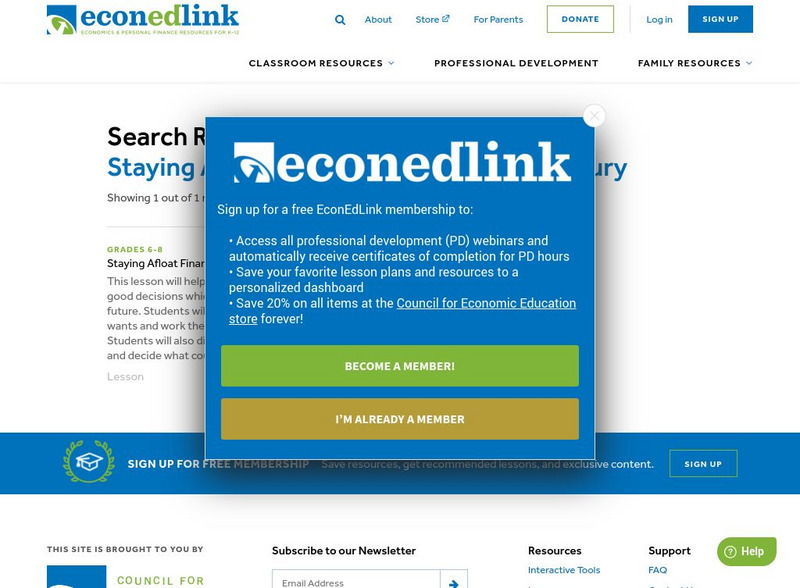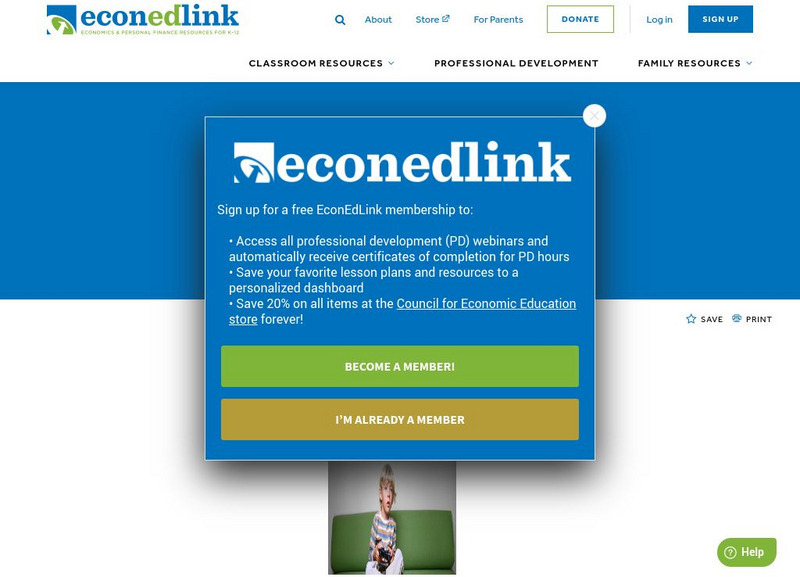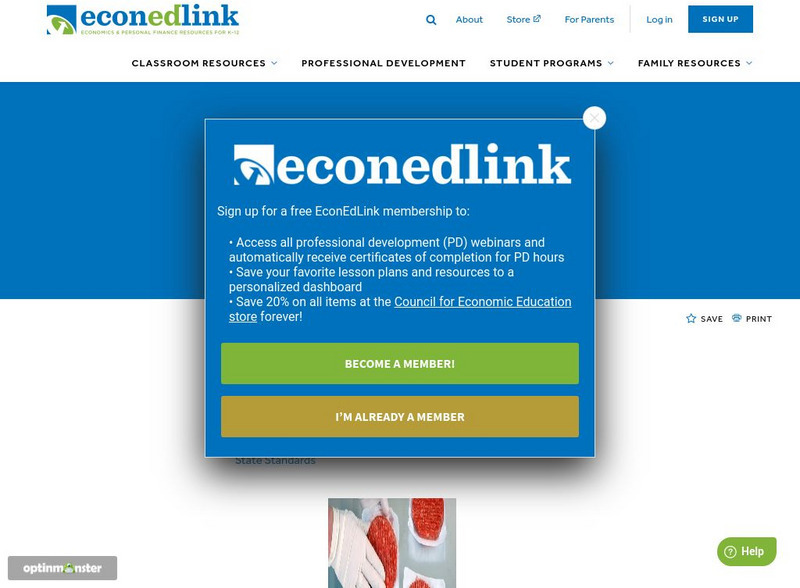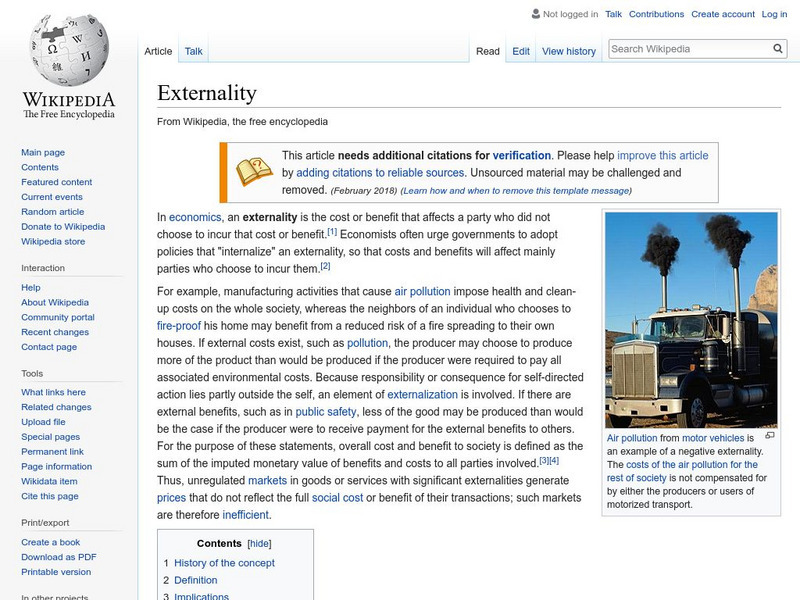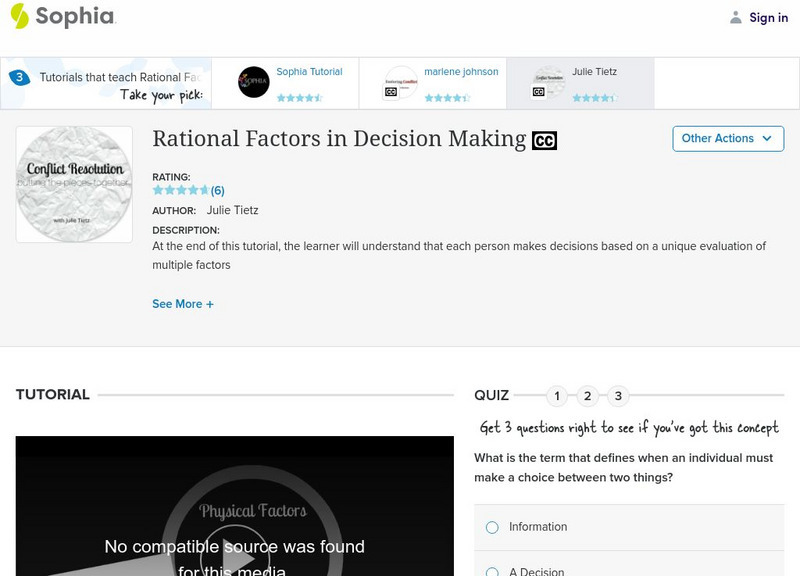Hi, what do you want to do?
Council for Economic Education
Econ Ed Link: How Much Is That Doggy?
Students will investigate the concept of total cost of ownership. They will brainstorm the costs of owning a dog or a cat. Students will calculate the total cost of ownership to help determine which might be the best pet for them.
Council for Economic Education
Econ Ed Link: Clipping Coupons
Explore this website to find out how and why consumers make choices on what products to buy. Learn how producers entice consumers into buying their products. This is a very informative lesson plan.
Council for Economic Education
Econ Ed Link: Incentives Influence Us
Find out more about the concept of incentives in our economy through this lesson plan. "You will identify incentives used at home and school."
Council for Economic Education
Econ Ed Link: Break a Leg
In this lesson, students will learn about the basic components and terminology of individual health insurance. Students will make decisions about the value of insurance protection and you will identify trends in the cost of medical care...
Council for Economic Education
Econ Ed Link: Satisfaction Please! (Part I)
Even the savviest consumer has a problem with a good or service on occasion. It is a consumer's right to complain when there is a genuine problem. In some situations, it is also a consumer's responsibility. A problem can't be fixed if no...
Council for Economic Education
Econ Ed Link: It's a Matter of Power
Students examine tradeoffs and profit- maximization decisions in the case study of Kaiser Aluminum, which decided to shut down aluminum production in favor of reselling electricity.
Council for Economic Education
Econ Ed Link: Professinoal Sports: If You Build It, Will They Come?
Special interest groups are able to have a substantial impact on the political system. Such groups can provide valuable services to individuals and to elected officials. They also can generate substantial benefits to a small minority.
Council for Economic Education
Econ Ed Link: Staying Afloat Financially in the 21st Century
This lesson will help students identify how to make good decisions which will help them financially in the future. Students will identify how to take their own wants and work them into a form of a personal budget. Students will also...
Council for Economic Education
Econ Ed Link: You Decide!
Think about a difficult decision you have had to make. After you decided did it work out? Why or why not? Why do you think decisions and choices are hard to make? We make personal decisions and we make decisions as groups. There is a...
Council for Economic Education
Econ Ed Link: Utility
Can happiness be measured? Learners will learn how utility relates to economic decision making and the law of diminishing marginal utility.
Council for Economic Education
Econ Ed Link: Dynamic Decision Making
Students will be introduced to the PACED Model and learn to use the parts of the model-- Problem, Alternatives, Criteria, and Evaluation- in solving problems and making decisions. They will practice using the model in decisions about...
Council for Economic Education
Econ Ed Link: President Obama's Allowance
In this instructional activity, students will identify different expenses in the US budget and will decide on the order of importance for different expenses.
Council for Economic Education
Econ Ed Link: Population Growth: Friend or Foe?
The environment has recently been the focus of much research and discussion. Because productive resources are limited, it is important that we use resources wisely to ensure that resources will be available for use in future generations....
Council for Economic Education
Econ Ed Link: There Is Something in the Water
The United States is losing 60,000 acres of wetlands each year. Is this good or bad? Does anyone really want to live in swamps, fens, bogs, and marshes? Or is it better economics to drain the wetlands for other purposes like agricultural...
Council for Economic Education
Econ Ed Link: National Parks: Only You Can Prevent the Coming Crisis
What do you think of when you think of the National Parks System? Do you think of the majesty of the Grand Canyon and the redwoods of Northern California? Or does the serenity of Cape Cod and the Everglades come to mind?
Council for Economic Education
Econ Ed Link: Guess Who's Coming to Dinner
This activity introduces regulation and information as two tools used by government to promote fair competition and complete information in a market economy. Using the 1906 Pure Food and Drugs Act as a case study, students explore the...
Council for Economic Education
Econ Ed Link: Why Cities Provide Tax Breaks
Like the state and federal government, local governments offer tax incentives to businesses to help solve economic and/or environmental problems. In this lesson, young scholars will explore three different cities and determine what...
Massachusetts Institute of Technology
Mit: Open Course Ware: Government Regulation of Industry
A course from MIT on the role of government in markets. Includes suggested readings, lecture notes, assignments and exams.
Council for Economic Education
Econ Ed Link: Hawaiian Economics: From the Mountains to the Sea
Ancient Hawaii was ruled by chiefs, who were responsible for the well-being of their people and for managing the islands' resources. The chiefs divided the islands into land districts shaped like pie slices called Ahupua'a (ah-who-...
Wikimedia
Wikipedia: Externality
Provides a definition and examples of an externality, both positive and negative, and the externality's effect on marginal private benefit and marginal social benefit.
Council for Economic Education
Econ Ed Link: Classroom Cash Incentive Plan
Learn more about the economy through this informative lesson. "In this lesson, you will learn how the incentive program affects the personal choices you make in class. You will also analyze how economic incentives can affect behavior."
Sophia Learning
Sophia: Rational Factors in Decision Making: Lesson 1
At the end of this tutorial, the learner will understand that each person makes decisions based on a unique evaluation of multiple factors. It is 1 of 3 in the series titled "Rational Factors in Decision Making:."
PBS
Pbs Teachers: Scientific American: Science Italian Style: Where's the Matter?
Explore some of the hard questions and issues related to scientific research and project funding. Role-play a mock Congressional hearing to discuss the wisdom of a new scientific venture with no perceivable practical use to mankind.
Science Education Resource Center at Carleton College
Serc: Geoethics Forums: The Grey Side of Green
Using the Geoethics Forums format, students are presented with a case study which explores the use of strategic minerals for green and clean technology.






